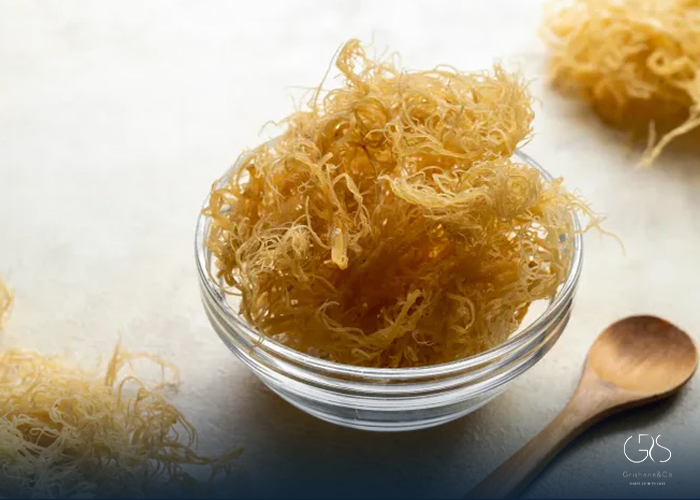Sea moss, also known as Irish moss or Chondrus crispus, is a type of algae that is often praised for its potential health benefits. Its rich nutritional profile and various claimed benefits have sparked interest among health enthusiasts. In this article, we will dive deep into the health benefits of sea moss, examine its potential risks, and provide tips for consuming it.
I. Health Benefits of Sea Moss:
1.May Improve Your Immune System:
Sea moss contains a wide range of vitamins, minerals, and antioxidants, which may contribute to strengthening the immune system. Research suggests that sea moss is rich in vitamin C and other antioxidants that can support immune function. Additionally, it has antimicrobial properties that may help fight against certain infections and boost overall immune health.
2.May Support Thyroid Health:
The high iodine content in sea moss makes it an attractive natural remedy for individuals with thyroid disorders. Iodine is a crucial mineral for proper thyroid function, and sea moss provides a natural source of iodine that may support the production of thyroid hormones. However, it is important to consult with a healthcare professional before using sea moss as a treatment for thyroid conditions.
To learn about thyroid-healthy foods , please refer to this article.

3.High Amount of Vitamins and Minerals:
Sea moss is a powerhouse of essential nutrients, including vitamins A, B, C, E, and K, as well as minerals like potassium, calcium, magnesium, and zinc. These nutrients play vital roles in various bodily functions, such as bone health, digestion, and energy production. Incorporating sea moss into your diet can help ensure you meet your daily requirements of these essential nutrients.
4.May Improve Gut Health:
Sea moss is rich in prebiotic fiber, which serves as food for beneficial gut bacteria. Prebiotics help support the growth and activity of these beneficial bacteria, promoting a healthy gut microbiome. A healthy gut microbiome is linked to improved digestion, better nutrient absorption, and a strong immune system. The fiber in sea moss can also help regulate bowel movements and prevent constipation.

5.May Increase Libido:
Traditionally, sea moss has been regarded as an aphrodisiac, with claims of increasing libido and enhancing sexual performance. While there is limited scientific evidence to support this claim, some anecdotal reports suggest that sea moss may have positive effects on sexual health and libido. However, further research is needed to validate these claims.
II. Nutrition Profile of Sea Moss:
Sea moss is low in calories and fat, making it a suitable addition to a balanced diet. Here is the approximate nutritional composition of 100 grams of raw sea moss:
- Calories: 4.9
- Fat: 0.016 g
- Sodium: 6.7 mg
- Carbohydrates: 1.23 g
- Fiber: 0.13 g
- Added sugars: 0 g
- Protein: 0.151 g
III. Risks of Sea Moss:
Iodine Overdose:
While iodine is essential for optimal thyroid function, consuming excessive amounts can lead to iodine toxicity. This can cause symptoms such as thyroid dysfunction, gastrointestinal discomfort, and skin reactions. Individuals with existing thyroid conditions or iodine sensitivity should exercise caution and consult their healthcare provider before incorporating sea moss into their diet.
Potential Contaminants:
Sea moss harvested from polluted waters may contain contaminants such as heavy metals and bacteria. To minimize the risk of contamination, it is important to source sea moss from reputable suppliers who follow proper harvesting and testing protocols. Thoroughly rinsing and soaking sea moss before consumption can also help reduce potential contaminants.
IV. Tips for Consuming Sea Moss:

Soaking and Preparing:
To prepare sea moss for consumption, rinse it thoroughly and soak it in water for at least 4-6 hours, or overnight. This helps hydrate and soften the sea moss, making it easier to blend into various recipes.
Incorporating Into Recipes:
Sea moss can be used as a thickening agent in smoothies, desserts, sauces, or as a nutritious addition to soups. Experiment with incorporating sea moss into different recipes to enjoy its benefits while enhancing the flavor and texture of your meals.
Moderation is Key:
Although sea moss has many potential health benefits, it is important to consume it in moderation as part of a well-balanced diet. Like any food, excessive intake may lead to unintended consequences. Consult with a healthcare professional to determine the appropriate amount of sea moss for your individual needs.
Conclusion:
Sea moss offers a wide array of potential health benefits, ranging from immune system support to gut health improvement. However, it is important to consider individual circumstances, potential risks, and consult with healthcare professionals when incorporating sea moss into your diet. By understanding its nutritional profile, risks, and appropriate consumption methods, you can make informed decisions about adding sea moss to your wellness routine.
Sources
- Healthline, Sea Moss: Benefits, Nutrition, and How to Prepare It
- Verywell Health, Sea Moss: Everything You Need to Know










